| Srl | Item |
| 1 |
ID:
186050
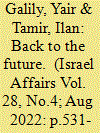

|
|
|
|
|
| Summary/Abstract |
Fifty years after the massacre of 11 Israeli athletes at the 1972 Summer Olympics at Munich, this tragic event still occupies a fundamental place in the bloodstained history of the Palestinian-Israeli conflict. In almost all respects it was a groundbreaking event that attracted unprecedented media exposure and substantially increased global awareness of the conflict. It also shaped Israel’s policy vis-à-vis abductions of its citizens by Palestinian terrorist organisations, which culminated in sweeping refusal to negotiate with them.
|
|
|
|
|
|
|
|
|
|
|
|
|
|
|
|
| 2 |
ID:
186058
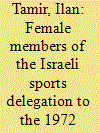

|
|
|
|
|
| Summary/Abstract |
This article discusses the experience and emotions of the two female members of the Israeli delegation to the 1972 Munich Olympics from a 50-year perspective. Interviews with them reveal a complex web of emotions including frustration directed at Germany, the International Olympic Committee, and even the Israeli delegation, which handled the event in a spontaneous and rather unprofessional manner.
|
|
|
|
|
|
|
|
|
|
|
|
|
|
|
|
| 3 |
ID:
186055
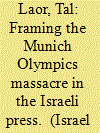

|
|
|
|
|
| Summary/Abstract |
This article analysed the real-time coverage of the 1972 Munich Olympics massacre by the three main Israeli newspapers at the time: Yediot Ahronot, Maariv and Haaretz. It found that while there were noticeable differences in the coverage of the event by the three papers, all of them framed the massacre as integral part of the black-and-white confrontation between Israel and Arab terrorism. Paradoxically, this ‘us’ vs. ‘them’ dichotomy seems to have played into the perpetrators’ hands by casting them as part of a formidable global terrorist network rather than a small fringe group, on the one hand, and as a significant factor affecting the possible evolution of Arab-Israeli peace negotiations, on the other
|
|
|
|
|
|
|
|
|
|
|
|
|
|
|
|
| 4 |
ID:
186053


|
|
|
|
|
| Summary/Abstract |
In many ways, the Black September killing of 11 Israeli athletes at the 1972 Munich Olympics tells little about the evolution of targeting sporting events by political and religious militants, though this attack has never been replicated in scale and drama. It introduced a post-World War II era in which secular nationalists rather than religious militants dominated the targeting of sporting events, executives and athletes. That may have been different if plans for attacks by religious militants had not failed or been foiled. Interestingly and more as a result of local circumstances, successful attacks on sporting events and personalities since Munich have struck a balance between having been perpetrated by secular and religious terrorists. This is true even if political violence since the 1980s has increasingly been perpetrated by religious rather than secular terrorists.
|
|
|
|
|
|
|
|
|
|
|
|
|
|
|
|
| 5 |
ID:
186057
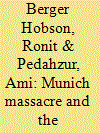

|
|
|
|
|
| Summary/Abstract |
The attack on members of the Israeli team during the 1972 Olympic Games in Munich, West Germany, was a critical juncture in the understanding of terrorism as theatre and in the fusion between counterterrorism and special operation forces. It created a path dependency in the way the terrorist threat is perceived and handled. For Israel, the attack was one in an ever increasing and constantly changing terrorist threat that helped shape its security apparatus and led to the proliferation of special operation forces units within the military, police and border police. Globally, the attack led to a spur in the establishment of special operation units with specific counterterrorism and hostage rescuing expertise. Overall, the media coverage of the Munich massacre and the failure of the German security forces in handling the crisis contributed to the survivability of special operation forces units. These units specialised in counterterrorism operations and later-on appropriated other types of missions and responsibilities while tightening their political ties and enhancing their public image. Most notably of these was the Israeli Sayeret Matkal.
|
|
|
|
|
|
|
|
|
|
|
|
|
|
|
|
| 6 |
ID:
186056
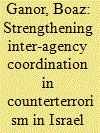

|
|
|
|
|
| Summary/Abstract |
The September 1972 Munich Olympics massacre brought to light the critical need for internal coordination and international cooperation among intelligence, security and enforcement agencies, government ministries, and many others who deal with counterterrorism. Through an historical overview of the role of the counter-terrorism bureau and with interviews of its former directors, this article presents the security lessons learned from the attack while providing an overview of the counterterrorism coordinator’s critical role in coordinating organisations focused counterterrorism operations, policy, and law.
|
|
|
|
|
|
|
|
|
|
|
|
|
|
|
|
| 7 |
ID:
186051


|
|
|
|
|
| Summary/Abstract |
The Munich Olympic Games were an opportunity to present to the world the ‘New Germany’. It was clear to everyone that the shadow of the Berlin Olympic Games would follow the Munich Olympic Games at every stage. This article deals with West Germany’s attempts to erase Berlin 1936 from the public consciousness and to redesign Germany’s image as a cosmopolitan, peace-seeking nation. Designing the new German image included innovative architectural design of the Olympic complex, concealing the prominent landmarks associated with the Nazi regime, visual design of the games in cosmopolitan spirit and opening ceremony without national pathos. Most notably absent were the armed security personnel at the Olympic village due to the fear of association that might be evoked by armed German soldiers. Yet reality struck the Germans in the face. The ‘New Image’ failed to hide the political disputes that arose during the games. The event was fraught with scandals with political overtones in addition to the massacre of the sportsmen by a terrorist organisation. The Games will forever be remembered due to the massacre and the rest of the scandals that occurred therein.
|
|
|
|
|
|
|
|
|
|
|
|
|
|
|
|
| 8 |
ID:
186054
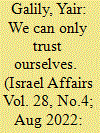

|
|
|
|
|
| Summary/Abstract |
This article contextualises the 1972 Munich Olympics massacre as an important factor in the advent of state counterterrorism strategy aimed at foreclosing the next terrorist outrage. While Mossad’s Operation Wrath of God failed to trace all culprits of the massacre, it nevertheless killed its mastermind Ali Hassan Salameh alongside scores of key PLO terrorists. This led to the effective demise of Palestinian terrorism in Europe and its return to the old modus operandi of attacking targets inside Israel. Fifty years after Munich, Israel needs to formulate an up-to-date strategy vis-à-vis Palestinian and Islamic terrorism that takes heed of the obstacles and opportunities presented by the current international system.
|
|
|
|
|
|
|
|
|
|
|
|
|
|
|
|
| 9 |
ID:
186052


|
|
|
|
|
| Summary/Abstract |
What began as the 1972 Munich Olympic Games quickly became a global media event, a live broadcast of a deadly terrorist attack that changed the future of modern terrorism. Broadcast to an audience of over 900 million, the event was a game changer that changed the relationships within the triangle terrorism-media-public. The ‘new’ terrorism, following the Munich massacre, has adapted the new rules of the game, the rules of media-oriented actions. Media-oriented terrorism is the use of pre-planned attacks that are wittingly designed to get media attention and coverage and consequently to reach the general public and decision makers. This article presents two powerful concepts in communication and terrorism paradigm that emerged from this tragic event: the notion of The Theatre of Terror and the notion of Coercive Media Events. Finally, it examines post-Munich trends and especially how terrorists’ migration to social media and online platforms has preserved and refined their lessons from the Munich attack.
|
|
|
|
|
|
|
|
|
|
|
|
|
|
|
|